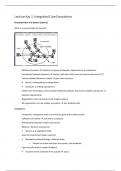Resume
Summary HPI4010 Organizing and Managing Patient Flows: Lectures, elaborated literature and cases + teachers's solutions of the sprints
- Cours
- Établissement
HPI4010 Organizing and Managing Patient Flows - Lectures - Elaborated literature and cases - Teachers's solutions of the sprints + maps With the help of this summary I got an 8/10 on the exam
[Montrer plus]



